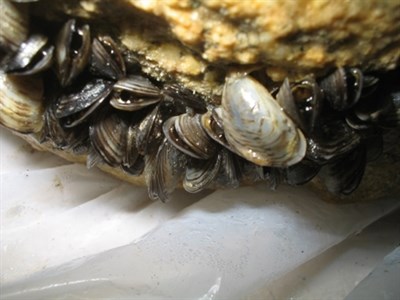
Zebra and quagga mussels are identified as two of B.C.'s most "unwanted species"
Image Credit: Invasive Species Council of B.C.
April 03, 2013 - 9:44 AM
By Julie Whittet
A potential invasion of zebra mussels into Okanagan waters is getting more media buzz these day as the concern grows. The finger-nail size mollusk is being described as a kind of waterborne disease that could plague Kelowna's drinking water, fisheries, tourism and real estate market.
While the mussels have not yet been observed in the lake, the species is spreading aggressively westward through Canada and southward in the United States.
“We're definitely at risk here in the Okanagan,” says Corinne Jackson, Communications Director for the Okanagan Basin Water Board.
Local water officials have flagged the Okanagan Lake as the next likely destination on the species' western trajectory. They are calling a public meeting this Thursday in Osoyoos to put the spotlight on the potential devastation wrought by the tiny mollusk.
The concern is that the mussels, which are invisible to the eye at their youngest stage, can easily hitch a ride with boaters travelling between lakes.
“The Zebra mussel can survive for up to a month in any damp area, be it fish tackle boxes, weighters, life-jackets, water toys or Sea-doos,” Jackson says.
“As far as we know, they're not in our waters.”
But it only takes one mussel. “One mussel will produce a million – within a few years you've got trillions,” Jackson says. The species has spread widely throughout North America since first appearing in the Great Lakes, transported by European shipping containers in the 1980's.
Thursday's meeting will address possible defensive measures, like funding inspection stations at B.C.'s border crossings. While there are some border controls in place, human error is still a troubling factor.
“Once it's in there, its a huge problem,” Jackson says. There was a recent incident where someone who had been boating in the mussel-infested Lake Mead failed to receive proper inspection, and put their boat back into Shuswap Lake without de-contamination.
“Nothing was stopping the boat – there was no legislation last summer, they let the boat through,” Jackson says.
Much costlier than Millfoil
While the Okanagan Lake is no stranger to invasive species like millfoil, the zebra mussel is truly a different breed. Where officials can actually control the spread of millfoil plants, through harvesting, the zebra mussel would be far more difficult to mitigate, not to mention costly.
“The damage from zebra mussels is going to be much worse” Jackson says. The water board recently did a study that projects a minimum cost of $42 million in damages to fisheries, tourism and real estate values.
Wide-ranging impact
If the Okanagan Lake does get hit with the zebra mussels, it would spell bad news for local fisheries. The organism would multiply at such a rate it would transform the lake's existing ecology. Jackson says the mussels could disturb native, at-risk species like the rocky mountain ridge mussel.
“If we do not keep this invasive species out, it will devastate the native mussels”
Kelowna's real estate market would suffer too. “Lakeshore property values will drop, mussels will make properties less enjoyable and less saleable,” Jackson says. The mussel's shells can ruin shoreline with sharp fragments known to cause lacerations and infections for swimmers.
They are also known to affect water quality. “It will affect the safety of our drinking water,” says Jackson. “They gum up water infrastructures for our drinking water supply.”
Tomorrow's meeting is aimed to get the message out to the public. “We're hoping people who have any interest in water will attend. If you enjoy clean drinking water, boating or fish, or even if you're a realtor, then we hope you would have an interest in the issue.”
To contact the reporter for this story, email Julie Whittet at jwhittet@infotelnews.ca or call (250)718-0428.
News from © iNFOnews, 2013